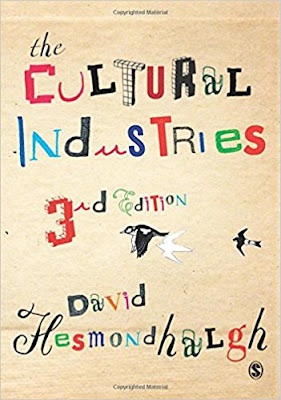MIGRAIN: The Cultural Industries - theory
Read media Factsheet 168 David Hesmondhalgh’s ‘The Cultural Industries’ and complete the following questions/tasks:
1) What does the term 'Cultural Industries' actually refer to?
The term ‘cultural industry’ refers to the creation, production, and distribution of products of a cultural or artistic nature. These include television and film production, publishing, music, as well as crafts and design. Some even say that architecture, performance and visual arts, and advertising are also part of a cultural industry.
2) What does Hesmondhalgh identify regarding the societies in which the cultural industries are highly profitable?
Societies in which the cultural industries are highly profitable tend to be societies that support the conditions where large companies, and their political allies, make money. These conditions being: constant demand for new products; minimal regulation outside of general competition law; relative political and economic stability; workforces that are willing to work hard.
3) Why do some media products offer ideologies that challenge capitalism or inequalities in society?
Hesmondhalgh also states that, in contemporary societies, the cultural industries often produce texts that offer ideologies which challenge capitalism or the inequalities of gender and racism in society. They do this in order to attract and maintain an audience while competing with other companies. Companies outdo each other to try and satisfy audience desires for the shocking, profane or rebellious.
4) Look at page 2 of the factsheet. What are the problems that Hesmondhalgh identifies with regards to the cultural industries?
The problems identified by Hesmondhalgh with regards to the cultural industries are-
• Risky business
• Creativity versus commerce
• High production costs and low reproduction costs
• Semi-public goods; the need to create scarcity
5) Why are so many cultural industries a 'risky business' for the companies involved?
Cultural industries is a risky business due to the many unpredictable factors associated with it.
Firstly, companies cannot predict exactly how audiences will use their product. Secondly, companies must ensure that they create something original and distinctive. Thirdly, the cultural industry company is reliant on other cultural industry companies to make audiences aware of the existence of a new product - they cannot completely control the publicity a product will receive because judgements and reactions of audiences, critics, journalists, etc. cannot accurately be predicted.
Despite all these factors. Cultural industries can be highly profitable if they are successful. However it may be difficult for a new or independent company to reach the same levels of profit.
6) What is your opinion on the creativity vs commerce debate? Should the media be all about profit or are media products a form of artistic expression that play an important role in society?
In my opinion, I think it should be a 50-50 balance between creativity and commerce. The cultural industry companies are a business and the aim of a business is to produce profit so we cannot completely go against the fact that cultural industries will make money. However, I think it is important to note that the product being made by these companies should be made with a creative mind and artistic expression so that it will contain a message that will benefit society.
Some cultural industry companies take advantage of the amount of money a product could make and pay no attention t the quality of the product. An example would be the Twilight franchise, specifically Twilight Breaking Dawn. The book by Stephenie Meyer included the full story for the ending of Twilight. However, movie producers decided to make two movies out of a single book. Breaking Dawn part 1 received an appalling score of 24% on Rotten Tomatoes. Despite this, the movie made a tremendous world wide gross of over $712,000,000. Producers knew that the movie will make money despite being a terrible movie because of the devoted and dedicated fans of twilight (book and movie franchise) that will watch the movie no matter what. This happens a lot in the media industry and I think that it is wrong.
7) How do cultural industry companies minimise their risks and maximise their profits? (Clue: your work on Industries - Ownership and control will help here)
Cultural industry companies minimise their risks and maximise their profits by becoming a conglomerate. They try to incorporate vertical and horizontal integration, synergy and diversification in to their company. Vertical integration reduces their costs. Horizontal integration allows them to reach a wider audience. Synergy helps them create a brand that audiences can identify with. Finally, diversification allows companies to keep up with the changes of modern technology.
8) Do you agree that the way the cultural industries operate reflects the inequalities and injustices of wider society? Should the content creators, the creative minds behind media products, be better rewarded for their work?
Yes I agree with the fact that the cultural industry companies operate in an unfair an injustice way. For example, after the production of a movie, the main actors/actresses will earn the most money. However, this is quite unfair as without the writers, editors, or creative minds behind the story and production, there would be no movie for the actors/actresses to be in. Furthermore, the people who put in the most effort, time and work are often paid the least which is disheartening. I believe that this unfair pay system should change.
Also, there are vast differences in terms of access to cultural industries in society, in terms of your level of wealth, gender or ethnicity. Meaning that not everyone can access a certain product which is also discriminatory.
9) Listen and read the transcript to the opening 9 minutes of the Freakonomics podcast - No Hollywood Ending for the Visual-Effects Industry. Why has the visual effects industry suffered despite the huge budgets for most Hollywood movies?
The visual effects industry has suffered drastically even despite the huge budget spent on visual effects because people are demanding for them to be more realistic. Directer Singer states 'to create that (VFX) in the computer takes a lot of time and engineers and brilliant, brilliant men and women who sit at computers for hours and hours and days and months to create a simple single effect at some points. And that just takes rooms and rooms that are vast'. Therefore visual effects industries are struggling to the extremely high costs associated with VFX.
10) What is commodification?
Commodification is the process of changing objects in to things that can be bought, sold or exchanged.
11) Do you agree with the argument that while there are a huge number of media texts created, they fail to reflect the diversity of people or opinion in wider society?
I believe that if we take one product (e.g. a film or Tv series) it will fail to reflect the diversity of people or opinion in wider society on its own. However, when we look at all the movies and TV shows that have ever been created, it is clear that all together they do reflect diversity and a wider opinion. Therefore, this isn't a question with a straightforward answer as it depends on what media text we are acknowledging and what diversity we are talking about.
12) How does Hesmondhalgh suggest the cultural industries have changed? Identify the three most significant developments and explain why you think they are the most important.
- Digitalisation- Cultural products are much more easily accessed thanks to the internet and modern technology. Due to this, cultural products have become more demanded by the public.
- Ownership and organisation- Cultural industries have become much more broad, engaging in diversification and integration to become conglomerates. This means they have a higher chance of success.
- Cultural texts- films, programmes, records, print media,etc. have been radically transformed. There is now a wider range of stories, topics and genres which means a wider range of audience is being attracted.



Comments
Post a Comment